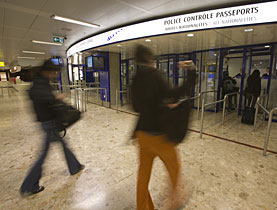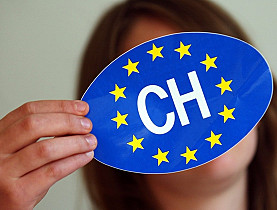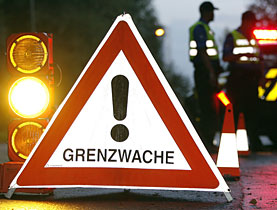Switzerland’s Schengen entry finally complete

Switzerland will complete its official entry into the "borderless" Schengen zone with the scrapping of airport passport controls on Sunday.
Airborne passengers travelling within the zone will no longer have to submit to routine passport checks in line with road and rail border crossings that relaxed controls when Switzerland implemented the agreement in December.
Switzerland was the 25th country from the European Union and European Free Trade Association to join the Schengen zone. It was set up to make travel between participating countries easier.
Aligning Swiss airports to the new system marks the final piece of the jigsaw that ended a process of preparation that stretched back to the signing of the agreement in 2004 and a positive referendum vote a year later.
Speaking at a ceremony at Zurich airport on Friday, Swiss President Hans-Rudolf Merz and European Commission Vice-President Jacques Barrot welcomed the move as a sign that Switzerland could move closer to the EU despite not being a full member.
“The entry of Switzerland into the Schengen area is a precious means to join the EU and Switzerland. It is a very important event because Switzerland and the EU will be closer,” Commissioner Barrot told swissinfo.
Relations sometimes rocky
Barrot also welcomed Switzerland’s acceptance of the related Dublin Convention, an EU law designed to streamline and improve the application process for political asylum seekers.
“It is very valuable that Switzerland accepts the duty of accepting persecuted people. It is a signal of good citizenship,” Barrot added.
Swiss voters rejected a proposal to join the European Economic Area in 1992 and said no in 2001 to a popular initiative asking the government to open negotiations for entry to the EU. But a number of bilateral treaties that bind Switzerland to various EU systems have since been implemented.
Swiss-EU relations have not always been harmonious, particularly on the issue of tax. Merz, who as finance minister is currently embroiled in a dispute with European neighbours over banking secrecy and tax evasion, said the bilateral path proved the two sides could still make progress.
“It has become a very useful and promising method for getting along with the European Union. This shows that step-by-step Switzerland can get along with the EU while keeping its independence,” he told swissinfo.
Security measures
Merz also believes that intensified security cooperation between participating countries would thwart criminals seeking to take advantage of relaxed border controls.
Swiss border police arrested 67 people for extradition, had found 112 missing persons and conducted 1,059 fruitful searches from the time Switzerland signed up to the Schengen Information system (SIS) criminal database in November last year to the end of February.
“At first glance, Schengen may seem like an attempt to square the wheel: greater security through greater freedom,” Merz said in a speech. “Upon closer inspection, however, this apparent contradiction is resolved.”
Airports were the last border points to complete preparations for Schengen because of the large infrastructure changes required to fulfil the new conditions.
Redevelopment at Switzerland’s largest airport, Zurich, cost around SFr300 million ($262 million) with costs being passed on to airport users in the shape of a SFr4 charge for every passenger.
swissinfo, Matthew Allen in Zurich
The Schengen Area comprises 25 countries, most of which are members of the EU, as well as the four member countries of the European Free Trade Asssociation – Iceland, Norway, Switzerland and Liechtenstein.
Some 255 million people and 116 million vehicles cross Swiss borders every year.
Britain and Ireland are not in the zone, but they have signed up to agreements on security.
A key element of the Schengen agreement is the Schengen Information Service (SIS), which includes a huge database in the French city of Strasbourg.
The SIS database enables police in any Schengen state to find out whether a suspect has been involved in any kind of crime across the EU.
The Schengen treaty takes its name from a town in Luxembourg where it was signed by Germany, France and the Benelux states in 1985.
As a member of the Schengen Area, Switzerland has to take on EU laws applicable to Schengen and Dublin. Bern negotiated one exception – references to banking secrecy.
Since the signing of the Schengen treaty in 2004, the EU has officially passed on 71 new laws to Switzerland on the issue.
A referendum has only been initiated against one issue – the introduction of passports with fingerprints. It will go to a nationwide vote in Switzerland on May 17.
Another change is likely to be controversial: Switzerland will have to shorten the maximum length of detention pending deportation from 24 months to 18.

In compliance with the JTI standards
More: SWI swissinfo.ch certified by the Journalism Trust Initiative
















You can find an overview of ongoing debates with our journalists here . Please join us!
If you want to start a conversation about a topic raised in this article or want to report factual errors, email us at english@swissinfo.ch.